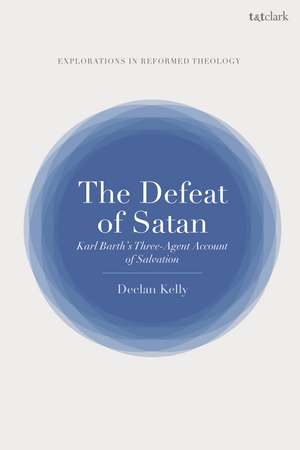The Defeat of Satan: Karl Barth's Three-Agent Account of Salvation: T&T Clark Explorations in Reformed Theology
Autor Dr Declan Kellyen Limba Engleză Paperback – 28 iun 2023
| Toate formatele și edițiile | Preț | Express |
|---|---|---|
| Paperback (1) | 189.70 lei 6-8 săpt. | +68.54 lei 6-12 zile |
| Bloomsbury Publishing – 28 iun 2023 | 189.70 lei 6-8 săpt. | +68.54 lei 6-12 zile |
| Hardback (1) | 538.26 lei 6-8 săpt. | +113.17 lei 6-12 zile |
| Bloomsbury Publishing – 23 feb 2022 | 538.26 lei 6-8 săpt. | +113.17 lei 6-12 zile |
Preț: 189.70 lei
Preț vechi: 248.47 lei
-24% Nou
Puncte Express: 285
Preț estimativ în valută:
36.30€ • 38.82$ • 30.27£
36.30€ • 38.82$ • 30.27£
Carte tipărită la comandă
Livrare economică 17 aprilie-01 mai
Livrare express 12-18 martie pentru 78.53 lei
Preluare comenzi: 021 569.72.76
Specificații
ISBN-13: 9780567698810
ISBN-10: 0567698815
Pagini: 176
Dimensiuni: 156 x 234 x 25 mm
Greutate: 0.25 kg
Editura: Bloomsbury Publishing
Colecția T&T Clark
Seria T&T Clark Explorations in Reformed Theology
Locul publicării:London, United Kingdom
ISBN-10: 0567698815
Pagini: 176
Dimensiuni: 156 x 234 x 25 mm
Greutate: 0.25 kg
Editura: Bloomsbury Publishing
Colecția T&T Clark
Seria T&T Clark Explorations in Reformed Theology
Locul publicării:London, United Kingdom
Caracteristici
Demonstrates the integration of Barth's doctrine of evil with the surrounding material in Church Dogmatics, and offers readers a way to think theologically about the New Testament's depiction of Satan's defeat
Notă biografică
Declan Kelly holds a PhD in systematic theology from the University of Aberdeen, UK.
Cuprins
AcknowledgmentsChapter 1IntroductionChapter 2Election and the Defeat of SatanChapter 3The Judgement of Satan's WorldChapter 4God's Covenant with DeathChapter 5God's Eschatological JustificationChapter 6ConclusionBibliographyIndex
Recenzii
Kelly has authored a very fine and surprising study of Barth's mature 'report' on the devil and God's triumph over all his works in the theology of the Church Dogmatics. His close reading of Barth's soteriology and his insightful analysis of the prominence and significance of this theme is as compelling as it is unsettling of received opinions, and rightly reminds us of the biblical depth and complexity of the Swiss theologian's dogmatic programme.
In this engaging and lucid volume, Declan Kelly demonstrates that the role of the Third Agent extends further into Karl Barth's soteriology than has previously been understood. His work will be instructive well beyond the confines of Barth scholarship. In particular, students of Pauline theology will find much that is of interest, particularly regarding Barth's articulation of the relationship between cross and resurrection. Highly recommended!
Declan Kelly subjects Barth's soteriology in Church Dogmatics to a fresh and remarkable interpretation. He points to a cosmological depth dimension of Barth's soteriology and shows that, in the wake of the doctrine of election, Barth conceives the doctrine of salvation as a three-agent drama. As a result, this study succeeds in uncovering, among other important things, new patterns of continuity (especially with CD III/3, §50 and CD IV/3, §69) that have been overlooked in the previous exclusively forensic interpretation of CD IV/1, §59. This book represents an important contribution to Barth research.
Kelly has provided a compelling reading of Barth's theology as a 'cosmological apocalyptic' three-agent soteriology. Throughout the book Kelly has a keen eye for the difficulties, lacunae, and sometimes inconsistencies that might lead readers to think otherwise, to place Barth as a predominantly 'forensic apocalyptic' two-agent theologian.
In this engaging and lucid volume, Declan Kelly demonstrates that the role of the Third Agent extends further into Karl Barth's soteriology than has previously been understood. His work will be instructive well beyond the confines of Barth scholarship. In particular, students of Pauline theology will find much that is of interest, particularly regarding Barth's articulation of the relationship between cross and resurrection. Highly recommended!
Declan Kelly subjects Barth's soteriology in Church Dogmatics to a fresh and remarkable interpretation. He points to a cosmological depth dimension of Barth's soteriology and shows that, in the wake of the doctrine of election, Barth conceives the doctrine of salvation as a three-agent drama. As a result, this study succeeds in uncovering, among other important things, new patterns of continuity (especially with CD III/3, §50 and CD IV/3, §69) that have been overlooked in the previous exclusively forensic interpretation of CD IV/1, §59. This book represents an important contribution to Barth research.
Kelly has provided a compelling reading of Barth's theology as a 'cosmological apocalyptic' three-agent soteriology. Throughout the book Kelly has a keen eye for the difficulties, lacunae, and sometimes inconsistencies that might lead readers to think otherwise, to place Barth as a predominantly 'forensic apocalyptic' two-agent theologian.




